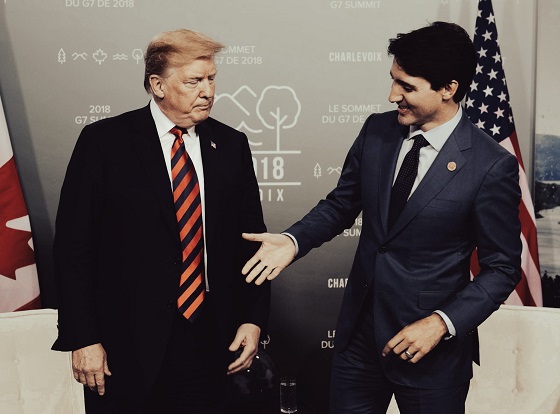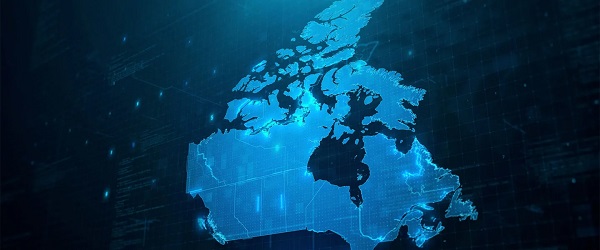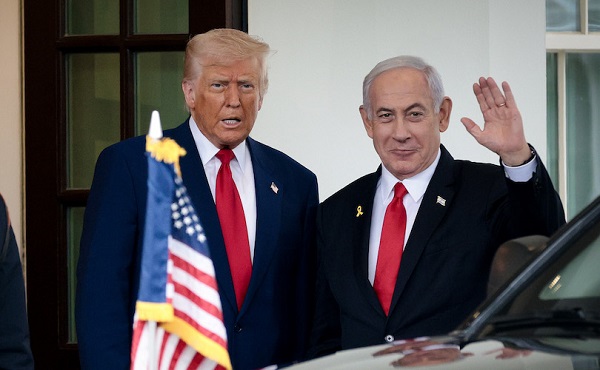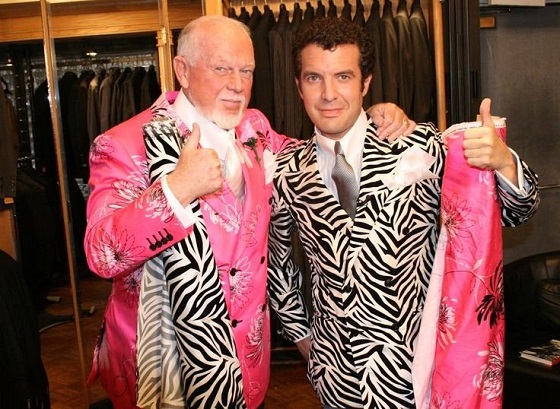Business
Trudeau’s Delusion Meets Trump’s Tariffs: 25% Hit on Canada and Mexico Could Cripple Economies Overnight!

In a fiery Truth Social post on November 25th, Donald Trump made his position crystal clear: the days of open borders, unchecked drug smuggling, and illegal immigration are over. The president-elect, set to take office in January, declared that one of his first actions as commander-in-chief will be to slap a 25% tariff on all goods from Mexico and Canada until both nations “use their absolute right and power” to stop the flow of drugs and illegal immigrants into the United States.
The Trump Doctrine Returns
This announcement serves as a bold reminder of Trump’s “America First” strategy, which dominated his first presidency. According to Trump, the current state of the U.S.-Mexico border is a “national emergency,” with caravans from Mexico allegedly bringing record levels of drugs like fentanyl and waves of illegal migrants. Canada isn’t off the hook either, as Trump accuses Justin Trudeau’s government of maintaining what he calls “ridiculous open borders” that have contributed to the crisis.
“Both Mexico and Canada have the absolute right and power to easily solve this long-simmering problem,” Trump stated. “Until such time that they do, it is time for them to pay a very big price!”
Economic Weapons Locked and Loaded
The proposed tariffs are no small matter. A 25% import tax on goods from Canada and Mexico could cripple their export-driven economies, both of which are heavily reliant on U.S. trade:
- Mexico: Over 80% of its exports head to the U.S. A 25% tariff would devastate industries like auto manufacturing, agriculture, and electronics.
- Canada: With 75% of exports destined for the U.S., Canadian businesses are bracing for significant disruptions to key sectors, including energy and auto parts.
Experts warn that these tariffs would also raise prices for American consumers. But Trump’s post signals he’s unfazed by potential backlash. “It’s time for these countries to pay a very big price,” he declared, echoing his tough-on-trade rhetoric from the 2016 campaign trail.
The Bureau – Canada’s Role in the Fentanyl Epidemic
According to The Bureau, U.S. investigators have uncovered a direct connection between Canadian cities—particularly Toronto and Vancouver—and transnational fentanyl money-laundering networks. These networks, allegedly run by Triads with ties to Beijing, are laundering cash for Mexican cartels smuggling fentanyl precursors from China.
David Asher, a former Trump administration official and DEA consultant, didn’t mince words in his interview with The Bureau. He stated that U.S. intelligence points to Canada as the “command and control” hub for these networks, which have fueled the devastating fentanyl crisis.
“When we seized their phones, we’d see Canada light up like a Christmas tree,” Asher said, highlighting how Toronto and British Columbia play central roles in these operations.
Canada’s Tariff Crisis: The Numbers Don’t Lie
Let’s dig into the cold, hard facts, courtesy of the Canadian Chamber of Commerce, and they’re downright devastating. Trump’s proposed tariffs aren’t just a political statement—they’re an economic wrecking ball aimed squarely at Canada’s most vulnerable industries. For Justin Trudeau’s government and hapless premiers like David Eby, these numbers are a brutal wake-up call.
The Trade Dependency Trap
Canada’s economic lifeblood is deeply tied to the United States, with 41% of Ontario’s GDP and a staggering two-thirds of New Brunswick’s GDP linked to cross-border trade. And it’s not just Canada feeling the squeeze—states like Michigan (14% GDP dependency) and Illinois (10.2%) rely heavily on Canadian trade.
The kicker? Nearly 63% of Canadian exports to the U.S. are intermediate inputs, meaning they’re critical components for American manufacturing. Canada isn’t just exporting products; it’s exporting the gears that keep U.S. industries turning.
Energy and Autos: The Collateral Damage
Consider this: in the first half of 2024 alone, Canada exported $85 billion in energy and $40 billion in auto parts to the U.S. A 25% tariff would obliterate these sectors, dragging down both economies in the process. And while Trudeau and his team posture about “standing united,” it’s clear their lack of preparation will only deepen the pain for Canadians.
Tariff Fallout: A National Recession Looms
The numbers paint a grim picture: a 25% tariff would deliver a 2.6% GDP decline annually for Canada, costing the average Canadian $2,000 CAD per year in lost income. Add in retaliatory tariffs, and this spirals into a full-blown recession, with cascading impacts on productivity, supply chains, and jobs.
- Auto/Transport Exports: Down 10 percentage points.
- Basic Metals Exports: Down 9 percentage points.
- Chemicals and Paper Products: Exports drop by 8% and 7%, respectively.
- Overall Sector Decline: A staggering 22 percentage points for critical industries.
Meanwhile, cross-border investment—once a pillar of Canada-U.S. relations—is under threat. Canadian investments in the U.S. total $1.1 trillion, but a tariff war risks destabilizing these flows and gutting the broader economic relationship.
Last Weeks Spin Piece from the Canadian Press
As we look at the fallout from Trump’s 25% tariff announcement, let’s take a moment to laugh at this spin piece from the Canadian Press that came out just last week. The article tried to paint a picture of Canada’s Foreign Affairs Minister Mélanie Joly claiming that Donald Trump’s return to the White House has somehow boosted Canada’s influence on the world stage. Yes, you heard that right—Canada, the same country with open borders, an overreliance on U.S. trade, and a prime minister whose leadership is about as effective as a broken clock, is supposedly advising the world on how to handle Trump.
Joly boldly declared from the Asia-Pacific Economic Cooperation summit in Lima, “No country understands the United States better than Canada.” According to her, nations are lining up to learn from Canada’s experience with Trump, as though Trudeau and his team have some masterclass on navigating Trump’s policies. Fast forward to today, with Trump poised to slam Canada with tariffs that could destroy their economy, and the absurdity of this claim is glaring.
This narrative that Canada is a calm, steady hand amid Trump’s return is nothing more than a fantasy. While Joly and Trudeau were hobnobbing at summits, Trump was gearing up to deliver real consequences. His 25% tariff on Canadian imports isn’t hypothetical—it’s a financial wrecking ball aimed at an economy that relies on U.S. trade for survival. Energy exports, autos, and agriculture—the pillars of Canada’s economy—will take a direct hit. But instead of preparing for this, Joly was busy spinning a tale of Canada’s supposed “influence.”
And let’s not forget what Joly was selling in that article. “Canada’s influence is actually increasing because of the impacts that the world is now facing with the new administration.” Increasing? On what planet? Trump’s tariffs make it clear that Canada isn’t leading anything; it’s scrambling to react.
The article also floated the idea that Trudeau was in a “privileged position” because of his past dealings with Trump. Let’s recall how that went, shall we? Trudeau was caught mocking Trump on a hot mic during a G7 summit, embarrassing himself and the country in front of world leaders. His government barely held onto a renegotiated NAFTA—now the USMCA—that Trump rewrote to suit America’s interests. If this is the kind of experience Trudeau brings to the table, it’s no wonder Canada is in trouble.
Meanwhile, the Canadian Press tries to prop up Trudeau as some staunch defender of “rules-based trade,” as though those rules mean anything when Trump has the leverage to rewrite them. Joly spoke about sending “clear messages” to Beijing, yet Trump’s tariff threats expose just how little Canada has done to address the very issues Trump is targeting. Let’s not forget The Bureau’s report on Canada’s role in fentanyl money laundering, with Toronto and Vancouver lighting up as command centers for Triads laundering cash from Mexican cartels. Canada’s failures are part of the problem Trump is confronting.
And here’s the kicker: as of today, neither Trudeau nor Joly has made a peep about Trump’s tariff announcement. No tweets, no press statements, no leadership—just silence. So much for being the world’s go-to expert on Trump. Canada’s leaders are AWOL while Trump tightens the economic screws.
While our beloved PM is silent, Jagmeet Singh, ever the opportunist, couldn’t resist wading into the chaos with his usual brand of hollow theatrics. “Stand up and fight like hell,” he bellowed at Justin Trudeau on Twitter, as though anyone has ever mistaken Singh for a warrior of any kind. Let’s be honest—Singh’s idea of “fighting like hell” probably involves drafting another toothless motion in Parliament or throwing shade on social media while offering zero solutions. This is the same guy who props up Trudeau’s government with his NDP-Liberal supply-and-confidence deal, enabling the very weakness he’s now trying to criticize. Spare us the tough talk, Jagmeet. Bootlicking Trudeau one day and grandstanding the next doesn’t exactly scream credibility.
And as for Trudeau and Mélanie Joly? Their performance over the last week has been nothing short of delusional. While Trump was setting the stage to unleash a 25% tariff that could dismantle Canada’s economy, Trudeau was busy posturing at international summits and snapping photos with global elites. Joly, for her part, claimed that Trump’s return to power somehow boosted Canada’s global influence—because apparently being a punching bag now counts as diplomacy.
This isn’t global influence; it’s global irrelevance. The Trudeau government spent the last week basking in delusion while Trump was preparing to drop the hammer. And now the clock has run out. Stay tuned—because while Trudeau dithers and Singh flails, the reckoning is here.
Final Thoughts
Trump campaigned on a clear and powerful message: tariffs are a weapon to protect American workers and restore national sovereignty. And, folks, he wasn’t wrong. Sure, input costs might rise. Sure, a few elites will clutch their pearls as their profits shrink. But this isn’t about them. This is about something bigger. It’s about standing up for the forgotten workers in Michigan, Ohio, and Wisconsin who’ve watched their livelihoods vanish thanks to decades of globalist betrayal. Trump’s message is loud and clear: no more one-sided trade deals, no more globalist bull. America comes first.
And what about Canada? What has Justin Trudeau done? He’s alienated an entire nation while dividing our own country with his disastrous, virtue-signaling policies. Trudeau doesn’t just dislike the West—he actively works against it. The West pays the bills in this country, folks. Alberta’s oil sands, Saskatchewan’s agriculture, and British Columbia’s resources prop up this nation’s economy. And how does Trudeau repay them? By demonizing their industries, their workers, and their very way of life to appease his climate cult.
While Trudeau struts on the world stage preaching green fantasies, the West bears the cost. It’s their jobs, their industries, and their communities that are hollowed out to fund his carbon tax schemes. Now, with Trump’s tariffs about to slam Canada’s economy, the true cost of Trudeau’s failures is finally coming home to roost.
How can Canada face this crisis when our so-called leader is more concerned with photo ops, platitudes, and meaningless “climate leadership” than standing up for our country? Trudeau has alienated our most important trading partner, antagonized the West, and is now leaving us unprepared for a showdown with Trump’s America.
Let’s look at the facts. Canada is at odds with China, embroiled in a cold war with India, and now staring down Trump’s tariffs. Every move Trudeau makes puts us further into isolation, weaker and more vulnerable. So here’s the question: can we really afford another year of this man at the helm?
The Trudeau government has run out of excuses, out of allies, and now, out of time. This isn’t just about whether Canada can survive Trump’s tariffs. It’s about whether we can survive another year of Justin Trudeau’s leadership. The reckoning is here, and Canada deserves better.
Subscribe to The Opposition with Dan Knight .
For the full experience, upgrade your subscription.
Agriculture
Canada’s supply management system is failing consumers

This article supplied by Troy Media.
The supply management system is cracking. With imports climbing, strict quotas in place and Bill C202 on the table, we’re struggling to feed ourselves
Canada’s supply management system, once seen as a pillar of food security and agricultural self-sufficiency, is failing at its most basic function:
ensuring a reliable domestic supply.
According to the Canadian Association of Regulated Importers, Canada imported more than 66.9 million kilograms of chicken as of June 14, a 54.6 per cent increase from the same period last year. That’s enough to feed 3.4 million Canadians for a full year based on average poultry consumption—roughly 446 million meals. Under a tightly managed quota system, those meals were supposed to be produced domestically. Instead imports now account for more than 12 per cent of this year’s domestic chicken production, revealing a growing dependence on foreign supply.
Supply management is Canada’s system for regulating dairy, poultry and egg production. It uses quotas and fixed prices to match domestic supply with demand while limiting imports, intended to protect farmers from global price swings and ensure stable supply.
To be fair, the avian influenza outbreak has disrupted poultry production and partially explains the shortfall. But even with that disruption, the numbers are staggering. Imports under trade quotas set by the World Trade Organization, the Canada-United States Mexico Agreement and the Comprehensive and Progressive Agreement for Trans-Pacific Partnership are running at or near their allowable monthly share—known as pro-rata
levels—signalling not just opportunity, but urgency. Supplementary import permits, meant to be used only in emergencies, have already surpassed 48 million kilograms, exceeding total annual import volumes in some previous years. This isn’t a seasonal hiccup. It’s a systemic failure.
The system, designed to buffer domestic markets from global volatility, is cracking under internal strain. When emergency imports become routine, we have to ask: what exactly is being managed?
Canada’s most recent regulated chicken production cycle, which ended May 31, saw one of the worst shortfalls in over 50 years. Strict quota limits stopped farmers from producing more to meet demand, leaving consumers with higher grocery bills and more imported food, shaking public confidence in the system.
Some defenders insist this is an isolated event. It’s not. For the second straight week, Canada has hit pro-rata import levels across all chicken categories. Bone-in and processed poultry, once minor players in emergency import programs, are now essential just to keep shelves stocked.
And the dysfunction doesn’t stop at chicken. Egg imports under the shortage allocation program have already topped 14 million dozen, a 104 per cent jump from last year. Not long ago, Canadians were mocking high U.S. egg prices. Now theirs have fallen. Ours haven’t.
All this in a country with $30 billion in quota value, supposedly designed to protect domestic production and reduce reliance on imports. Instead, we’re importing more and paying more.
Rather than addressing these failures, Ottawa is looking to entrench them. Bill C202, now before the Senate, seeks to shield supply management from future trade talks, making reform even harder. So we must ask: is this really what we’re protecting?
Meanwhile, our trading partners are taking full advantage. Chile, for instance, has increased chicken exports to Canada by more than 63 per cent, now accounting for nearly 96 per cent of CPTPP-origin imports. While Canada doubles down on protectionism, others are gaining long-term footholds in our market.
It’s time to face the facts. Supply management no longer guarantees supply. When a system meant to ensure resilience becomes a source of fragility, it’s no longer an asset—it’s an economic liability.
Dr. Sylvain Charlebois is a Canadian professor and researcher in food distribution and policy. He is senior director of the Agri-Food Analytics Lab at Dalhousie University and co-host of The Food Professor Podcast. He is frequently cited in the media for his insights on food prices, agricultural trends, and the global food supply chain.
Troy Media empowers Canadian community news outlets by providing independent, insightful analysis and commentary. Our mission is to support local media in helping Canadians stay informed and engaged by delivering reliable content that strengthens community connections and deepens understanding across the country.
Business
Prairie provinces and Newfoundland and Labrador see largest increases in size of government

From the Fraser Institute
By Jake Fuss and Grady Munro
A recent study found that Canada has experienced one of the largest increases in the size of government of any advanced country over the last decade. But within Canada, which provinces have led the way?
The size of government refers to the extent to which resources within the economy are controlled and directed by the government, and has important implications for economic growth, living standards, and economic freedom—the degree to which people are allowed to make their own economic choices.
Too much of anything can be harmful, and this is certainly true regarding the size of government. When government grows too large it begins to take on roles and resources that are better left to the private sector. For example, rather than focusing on core functions like maintaining the rule of law or national defence, a government that has grown too large might begin subsidizing certain businesses and industries over others (i.e. corporate welfare) in order to pick winners and losers in the market. As a result, economic growth slows and living standards are lower than they otherwise would be.
One way to measure the size of government is by calculating total general government spending as a share of the economy (GDP). General government spending refers to spending by governments at all levels (federal, provincial, and municipal), and by measuring this as a share of gross domestic product (GDP) we can compare across jurisdictions of different sizes.
A recent study compared the size of government in Canada as a whole with that of 39 other advanced economies worldwide, and found that Canada experienced the second-largest increase in the size of government (as a share of the economy) from 2014 to 2024. In other words, since 2014, governments in Canada have expanded their role within the economy faster than governments in virtually every other advanced country worldwide—including all other countries within the Group of Seven (France, Germany, Italy, Japan, the United Kingdom, and the United States). Moreover, the study showed that Canada as a whole has exceeded the optimal size of government (estimated to fall between 24 and 32 per cent of GDP) at which a country can maximize their economic growth. Beyond that point, growth slows and is lower than it otherwise would be.
However, Canada is a decentralized country and provinces vary as to the extent to which governments direct overall economic activity. Using data from Statistics Canada, the following charts illustrate which provinces in Canada have the largest size of government and which have seen the largest increases since 2014.

The chart above shows total general government spending as a share of GDP for all ten provinces in 2023 (the latest year of available provincial data). The size of government in the provinces varies considerably, ranging from a high of 61.4 per cent in Nova Scotia to a low of 30.0 per cent in Alberta. There are geographical differences, as three Atlantic provinces (Nova Scotia, Prince Edward Island, and New Brunswick) have the largest governments while the three western-most provinces (Alberta, Saskatchewan, and British Columbia) have the smallest governments. However, as of 2023, all provinces except Alberta exceeded the optimal size of government—which again, is between 24 and 32 per cent of the economy.

To show which provinces have experienced the greatest increase in the size of government in recent years, the second chart shows the percentage point increase in total general government spending as a share of GDP from 2014 to 2023. It should be noted that this is measuring the expansion of the federal government’s role in the economy—which has been substantial nationwide—as well as growth in the respective provincial and municipal governments.
The increases in the size of government since 2014 are largest in four provinces: Newfoundland and Labrador (10.82 percentage points), Alberta (7.94 percentage points), Saskatchewan (7.31 percentage points), and Manitoba (7.17 percentage points). These are all dramatic increases—for perspective, in the study referenced above, Estonia’s 6.66 percentage point increase in its size of government was the largest out of 40 advanced countries.
The remaining six provinces experienced far lower increases in the size of government, ranging from a 2.74 percentage point increase in B.C. to a 0.44 percentage point increase in Quebec. However, since 2014, every province in Canada has seen government expand its role within the economy.
Over the last decade, Canada has experienced a substantial increase in the size of total government. Within the country, Newfoundland and Labrador and the three Prairie provinces have led the way in growing their respective governments.
-

 Crime2 days ago
Crime2 days agoBryan Kohberger avoids death penalty in brutal killing of four Idaho students
-

 International2 days ago
International2 days agoCBS settles with Trump over doctored 60 Minutes Harris interview
-

 Business2 days ago
Business2 days agoWhy it’s time to repeal the oil tanker ban on B.C.’s north coast
-

 Energy2 days ago
Energy2 days agoIf Canada Wants to be the World’s Energy Partner, We Need to Act Like It
-

 Alberta1 day ago
Alberta1 day agoAlberta Provincial Police – New chief of Independent Agency Police Service
-

 Business2 days ago
Business2 days agoLatest shakedown attempt by Canada Post underscores need for privatization
-

 Alberta2 days ago
Alberta2 days agoPierre Poilievre – Per Capita, Hardisty, Alberta Is the Most Important Little Town In Canada
-

 MxM News2 days ago
MxM News2 days agoUPenn strips Lia Thomas of women’s swimming titles after Title IX investigation












